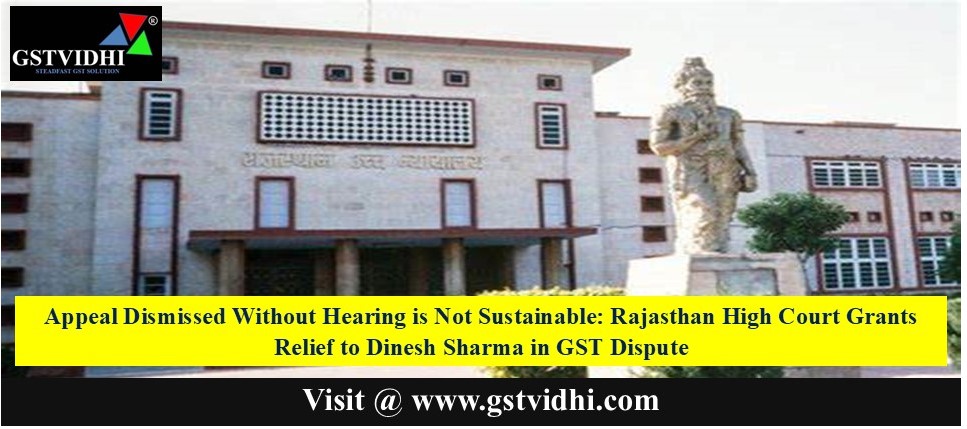
Appeal Dismissed Without Hearing is Not Sustainable: Rajasthan
High Court Grants Relief to Dinesh Sharma in GST Dispute
Introduction
Under the GST framework,
taxpayers have the right to appeal against adverse orders. However, this right
is not merely procedural—it includes the right to fair hearing and proper
consideration of statutory timelines. The Rajasthan High Court in Dinesh
Sharma vs Union of India & Others has emphasized this in a significant
judgment, setting aside the appellate order that dismissed the appeal as
time-barred without hearing the assessee.
Case
Snapshot
- Case Title:
Dinesh Sharma vs Union of India & Others
- Writ Petition Nos.:
D.B. Civil Writ Petition No. 10017/2024, 10019/2024, and 10066/2024
- Neutral Citation No.:
2025:RJ-JP:4219-DB
- Court:
Rajasthan High Court, Jaipur Bench
Background
of the Case
The petitioner, Dinesh
Sharma, is the proprietor of M/s Jai Ganpati Stone Crusher, a
registered taxpayer under the GST Act. He approached the Rajasthan High Court
through multiple writ petitions, challenging orders passed by the Appellate
Authority under the CGST/SGST regime.
Sequence of Events
1. Adjudication
Order: An adverse order was passed by the adjudicating
authority on 24 August 2023.
2. Appeal
Filed: The petitioner filed an appeal against this order on 23
April 2024.
3. Appeal
Rejected: The appeal was dismissed on 30 April 2024 by
the Appellate Authority on the ground that it was filed beyond the
limitation period.
4. Writ
Petitions Filed: Aggrieved by the rejection, the
petitioner filed three writ petitions challenging the dismissal as arbitrary
and in violation of natural justice.
Petitioner’s
Arguments
The petitioner, through
his counsel, made the following submissions:
1. Appeal Was Filed
Within Limitation
- The limitation should be counted
from the date of communication of the adjudication order.
- The petitioner contended that the certified
copy of the order was received much later, and therefore the appeal
was filed well within the permissible period as per Section
107(1) of the CGST Act.
2. No Opportunity of
Hearing Provided
- The Appellate Authority dismissed the
appeal without providing an opportunity of being heard.
- This amounted to a gross violation
of principles of natural justice.
3. No Finding on Date of
Communication
- The appellate order did not record
any finding on the date when the order was actually communicated
to the petitioner.
- This omission led to wrong
computation of limitation.
Respondents’
Stand
The State and Union
Government, represented by their respective counsels, contended:
- The appeal was filed beyond the
prescribed period, and hence, the dismissal was justified.
- However, they did not conclusively
dispute or prove the date of communication of the adjudication order.
Issues
Before the Court
The Hon’ble Division
Bench analyzed the following legal issues:
1. Whether
the limitation for filing an appeal under Section 107 of the CGST Act starts
from the date of the order or the date of its communication to the assessee?
2. Whether
dismissal of appeal without hearing the assessee is sustainable in law?
3. Whether
absence of finding regarding communication of order vitiates the appellate
order?
Observations
of the Court
The Court examined the
appellate order and relevant statutory provisions.
1. Limitation Starts from
Date of Communication
- As per Section 107(1) of the
CGST Act:
"Any person
aggrieved by any decision or order passed under this Act by an adjudicating
authority may appeal to the prescribed authority within three months from the
date on which such decision or order is communicated to such person."
- The Court observed that the Appellate
Authority wrongly calculated limitation from the date of order
(24.08.2023) instead of from the date of its communication.
2. No Finding on
Communication Date
- The appellate order lacked any
discussion or finding regarding when the order was actually received
by the petitioner.
- The absence of this critical fact
made the order unsustainable.
3. Violation of Natural
Justice
- The petitioner was not granted an
opportunity of hearing before dismissing the appeal.
- Such procedural violation rendered
the dismissal arbitrary and illegal.
“The Appellate Authority
has dismissed the appeal without providing an opportunity of hearing. There is
no finding recorded with regard to the date of communication of order to the
petitioner.” — Court
Judgment
The Division Bench
comprising Justice Avneesh Jhingan and Justice Shubha Mehta held:
- The impugned appellate order dated
30.04.2024 is set aside.
- The matter is remitted back to
the Appellate Authority for fresh adjudication after providing
an opportunity of hearing to the petitioner.
- The Appellate Authority must determine
the date of communication of the adjudication order before deciding
limitation.
Conclusion
of the Court:
“The impugned orders are
set aside and the matter is remitted back to the Appellate Authority to decide
the appeal in accordance with law after providing an opportunity of hearing.”
Disclaimer: All the Information is based on the notification, circular and order issued by the Govt. authority and judgement delivered by the court or the authority information is strictly for educational purposes and on the basis of our best understanding of laws & not binding on anyone.
Find the Attachment (Press on Click Here )
Click here